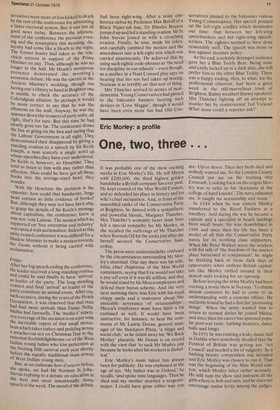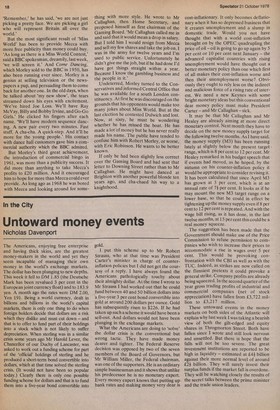Eric Morley: a profile
One, two, three . . •
It was probably one of the most exciting weeks in Eric Morley's life. He left Mecca with £200,000, the third highest golden handshake a British company has ever paid. He kept control of the Miss World Contest, and so defended his place in history and his wife's chief occupation. And, in front of the assembled ranks of the Conservative Party at Brighton, he danced with a sympathetic and powerful blonde, Margaret Thatcher. Mrs Thatcher's womanly heart must have felt a special sympathy for Mr Morley, as she recalled the sufferings of Mr Thatcher when Burmah Oil hit the rocks just after she herself secured the Conservative leadership. The press were understandably confused by the circumstances surrounding Mr Morley's dismissal. One day there was his wife, Julia, chief chaperone of the Miss World contestants, saying that Eric would not take a pay-off even if it was £6 million, and that he would stand by his Mecca employees and defend their bonus scheme. And the very next morning there was Eric with his usual chirpy smile and a statement about 'the amicable severance of relationships'. Mecca's employees must have been a bit confused as well. It would have been instructive, for instance, to hear the comments of Mr Laurie Doran, general manager of the Stockport Plaza, 'a bingo and social club,' as he tidied away his 'We Back Morley' placards. Mr Doran is on record with the view that 'to sack Mr Morley just because he looks after his workers is diabolical.'
Eric Morley's main talent has always been for publicity. He was orphaned at the age of ten. 'My father was at Oxford,' he recalls, 'and spoke nine languages. Then he died and my mother married a sergeantmajor. I could have gone either way you see. Up or down. Then they both died and nobody wanted me. So the London County Council put me on the training ship Exmouth. Looking back on his origins Morley was to refer to his 'doctorate at the college of hard knocks'. The navy educated me. It taught me seamanship and music.'
In 1934 when he was sixteen Morley transferred to the Royal Fusiliers as a bandboy. And during the war he became a captain and a specialist in beach landings from small boats. He was demobilised in 1946 and since then his life has been a model of all that the Conservative Party wants for its working class supporters. When Mr Peter Walker woos the workers with his talk of 'the freedom of the market place harnessed to compassion', he might be thinking back to those dark days of opportunity when embryo British capitalists like Morley rattled around in their demob suits looking for an opening.
Before leavng the army Morley had been running a troop show in Norway. To obtain decent costumes he had to come to an understanding with a customs officer. He suddenly found he had a flair for 'promoting things'. When the army wanted him to return to normal duties he joined Mecca, and since then his career has spanned popular post-war taste: bathing beauties, dance halls and bingo.
In 1951 he was running a leaky dance hall in Dublin when somebody decided that the Festival of Britain was getting too 'Art Council' and needed a bit of vulgarity. So a bathing beauty competition was included and Eric Morley was chosen to run it. That was the beginning of the Miss World contest, which Morley takes rather seriously. He still runs the show and instructs all the girls where to bob and turn, and he does not encourage undue levity among the judges. 'Remember,' he has said, 'we are not just picking a pretty face. We are picking a girl who will represent Britain all over the world.'
But the most significant result of 'Miss World' has been to provide Mecca with more free publicity than money could buy. 'As long as there is a Miss World Contest,' said a BBC spokesman, dreamily, last week, 'we will screen it.' And Come Dancing, which Morley sold to the BBC in 1950, has also been running ever since. Morley is a genius at selling television or the newspapers a pup, and persuading them to come back for another one. In the old days, when he talked about 'my new show', the tears streamed down his eyes with excitement. 'We've hired Joe Loss. We'll have Ray McVay, Billy and Bobby Irvine, and Go-Go Girls.' He clicked his fingers after each name. 'We'll have modern sequence dancing. A new pair every two minutes. Fast Stuff. A cha-cha. A quick-step. And it'll be more for the young people.' His contact with dance hall customers gave him a commercial authority which the BBC admired.
But Morley's third great achievement, the introduction of commercial bingo in 1961, was more than a publicity success. It did more than anything to take Mecca's profits to £20 million. And it encouraged him to hope for more than Mecca could ever provide. As long ago as 1968 he was bored with Mecca and looking around for some thing with more style. He wrote to Mr Callaghan, then Home Secretary, and proposed himself as first chairman of the Gaming Board. `Mr Callaghan called me in and said that it would mean a drop in salary. But I told him I would resign from Mecca and sell my few shares and take the job on. I was in the army for twelve years and I'm used to public service. Unfortunately he didn't give me the job, but if he had done I'd have got things straight within a year. Because I know the gambling business and th people in it.'
Undeterred, Morley turned to the Conservatives and informed Central Office that he was available for a south London constituency. At first he was discouraged on the grounds that his opponents would make too many jokes about Miss World. But at the last election he contested Dulwich and lost. Now, at sixty, he must be wondering whether he has missed the boat. He has made a lot 'of money but he has never really made his name. The public have tended to confuse him with Robert Morley, or worse, with Eric Robinson. He wants to be better known.
If only he had been slightly less correct over the Gaming Board and had sent that letter to Downing Street rather than to Mr Callaghan. He might have danced at Brighton with another powerful blonde ten years ago, and cha-chaed his way to a knighthood.







































 Previous page
Previous page